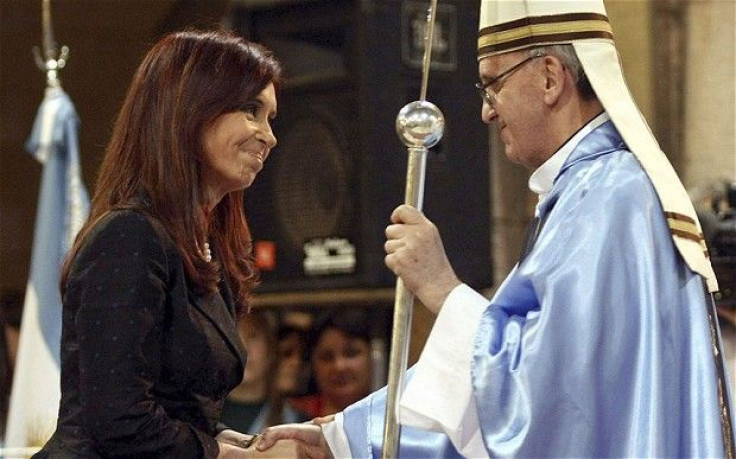Higher Mediation: Will The Argentine Pope Get Involved In The Falkland Islands Dispute?

Now that she has a fellow countryman in a very high place, the president of Argentina, Cristina Fernández de Kirchner, has indirectly suggested that Jorge Mario Bergoglio (i.e., the newly elected Pope Francis) could mediate over the disputed Falklands Islands, which Great Britain and Argentina both claim sovereignty over.
While congratulating the Pope on his election during a televised address, Fernandez also said she hoped that "he carries the message to the great world powers that they participate in dialogue.”
The Daily Telegraph newspaper of Britain reported that while she did not mention the Falklands (or Las Malvinas, as Argentines refer to the archipelago) by name during her address, the term “major world powers” is understood to be a reference to Britain and “dialogue” a reference to Argentina’s repeated calls for a diplomatic mediation to the final sovereignty of the islands (which the UK has refused).
"We wish him [Pope Francis] all the luck in the world in his pastoral mission and what it means for Latin America and Argentina --- we hope that it will be significant for our region," the president said.
"[We hope]… that the great powers in the world, who have arms and financial power, can be convinced to finally heed the emerging countries and that they commit to a dialogue of civilizations where things are resolved by diplomatic channels rather than by force."
Fernandez then added: "We trust plainly in this vision and we ask God that he help make it possible that just causes also sometimes triumph in this blessed land we call Earth, because I am sure that God and the Virgin also wish it so."
The decades old spat over the islands between Britain and Argentina (which erupted into a brief, but deadly, war in 1982) recently gained renewed currency when Falklanders overwhelmingly endorsed a referendum last week to remain a British Overseas Territory. In response, Kirchner and other top Argentine officials dismissed the vote as irrelevant and a “parody.”
The Telegraph noted that it is unclear what the pope’s views on the Falklands are, but that he once told a group of Argentine war veterans that those soldiers who died in the 1982 war were simply "reclaiming what is theirs.”
Moreover, last year during a commemoration of the 30th anniversary of the Falklands War, Cardinal Bergoglio (as he was known then) delivered a Mass in which he proclaimed: "We come to pray for those who have fallen, sons of the homeland who set out to defend his mother, the homeland, to claim the country that is theirs and they were usurped.”
"Many young people were there and could not return. Others returned but none could forget. Many scars, many families destroyed by permanent absence or a return cut short. The country needs to remember them all," Bergoglio added during his address.
But the head of the Catholic Church on the disputed islands apparently has no conflicts with the new Pope whatsoever.
The Buenos Aires Herald reported that Monsignor Michael McMarcam told the paper he was happy about the election in the Vatican.
“I am delighted first of all of having a new pope so quickly, and quite excited about the prospect of an Argentine cardinal becoming the new pope,” McMarcam said.
“I think it’s going create some very interesting reaction. But I’m sure the more we get to know who he is, and know a little bit more about him, we will get the same kind of rapport as we received from Pope Benedict. He will be received as the pope, and will be listened as the pope, doesn’t matter where he comes from.”
McMarcam added: “[The pope] looked very serene and dignified. The Catholic congregation is very small in the island. But, how [will] the people will react to having an Argentine pope? It will take a bit of time, but he will be seen more as the pope rather than an Argentine. His first visit will be to Argentina, I would like to think perhaps he will be able to say some words to sooth the [Falklands] situation, a situation which is not real, is created by politics, that’s my view, and I don’t think I’m alone.”
It remains to be seen if the pope, who has very large issues within the church to deal with, would want to get involved in something as relatively minor, but intractable, as the whole Falklands-Malvinas kerfuffle.
However, political activism by a Holy Father is certainly not unheard of.
For example, the Polish-born Pope John Paul II, who reigned for 27 years until his death in 2005, frequently took political positions – including making repeated attacks on Soviet Communism, as well as issuing bitter criticisms of the U.S.-led invasion of Iraq in 2003.
© Copyright IBTimes 2024. All rights reserved.











